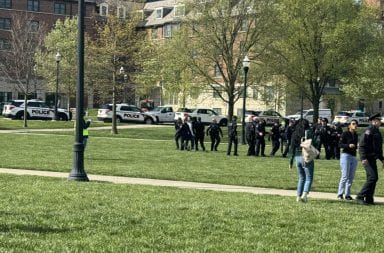
Ramadan begins this weekend and Muslim students will celebrate all month long with fasting, prayer and religious devotions. Credit: Courtesy of Khalid Dada
With Ramadan beginning this weekend, Muslim students will celebrate as the month of fasting, prayer and religious devotion overlaps with the rest of the academic year, including finals week.
In observance of Ramadan, the ninth month of the Islamic calendar, Muslims abstain from eating food and drinking water from sunrise to sunset, devoting themselves to prayer and reflection on their faith for 30 days. Khalid Dada, a third-year in public policy analysis and co-president of the student organization Muslim Students’ Association, said the group and university leadership have worked to accommodate and advocate for students during the holy month.
“A lot of it was event-based work and ensuring people have food and their spiritual needs met,” Dada said. “But there was also that advocacy push to ensure that our university understands what Ramadan entails for Muslim students and how the university can support us.”
Ramadan will likely begin Saturday, based on a sighting of a crescent moon, and end on Eid al-Fitr. Eid al-Fitr is a celebration that marks the end of Ramadan fasting, which will likely take place during finals week on May 2, also based on lunar sightings.
On-campus prayer, dining accommodations
Amina Basharat, a fourth-year in political science and international studies and co-president of the Muslim Students’ Association, said many students need to travel long distances to mosques and do not have family nearby. To address this, the organization reserved rooms in the Ohio Union for all 30 days of Ramadan at sundown, when Muslims students can break their fast and pray.
Exact times and meeting locations at the Union can be found on the the Muslim Students’ Association’s Instagram page.
Suhoor, the meal that takes place before fasting begins at sunrise, is eaten before Fajr, one of the five obligatory prayers. The nightly meetings at the Union will begin at sunset with Maghrib prayer — another required daily prayer — followed by a meal to break the fast, called Iftar. Dada said local Muslim organizations and restaurants will donate free Halal meals with the help of Noor Business, a local Muslim-owned company.
Students can take their meals home with them or eat their meals at the Union, Dada said.
“These meals will be Mediterranean and South Asian dishes to bring some sense of home onto campus, so that they’re eating meals they’re used to,” Dada said.
The Muslim Students’ Association will continue to hold its regular meetings, service opportunities and social events for April along with its Ramadan gatherings, according to the group’s website.
On campus, Basharat said university Dining Services have made accommodations for students fasting in April.
“We wanted to make sure students had a lot of healthy options, a variety of foods that felt like home-cooked meals, especially students who are doing away from home and doing Ramadan alone for the first time this year,” Basharat said.
University spokesperson Dave Isaacs said Traditions dining locations will offer extended hours from 7 a.m. to 10 p.m. to accommodate students fasting until sundown. Curl Market, Union Market and Traditions will also have an expanded offering of Halal food for Muslim students, and grab-and-go meals will be offered.
Dada said free water and dates, often eaten once Muslims can break their fast after sunset for Iftar, will be available at Woody’s Tavern upon request.
During a fast, students can experience headaches, irritability and dehydration, Basharat said, negatively impacting performance on exams.
Anticipating longer days near the end of the semester, Dada said the Muslim Students’ Association wants to focus on advocacy for Ramadan this year, as Muslim students will fast for over 15 hours a day, Dada said.
Exam accommodations
Ryan Hunt, associate university registrar, said in an email the University Registrar’s testing center will provide extended hours by appointment before sunrise and after sunset during the week of April 25 through the end of finals. Students who require testing accommodations must work with their instructor and then make an appointment with the testing center online.
Basharat said the organization provided Muslim students with a customizable template via its Instagram to send to their professors, should they need to request exam accommodations during Ramadan.
“We want to make sure students aren’t being forced to take final exams really early in the morning or late in the day when it’s time to be eating,” Basharat said. “We don’t want any student to have to compromise their education for the fact that they are fasting for religious purposes.”
Universitywide preparations, policies
Muslim Students’ Association also worked with Vice Provost and Dean of University Libraries Damon Jaggars this semester to advocate on behalf of Muslim students.
On Jan. 14, Jaggars sent an email to faculty encouraging flexibility as the entire month of Ramadan overlaps with the academic year. On March 25, Jaggars and Helen Malone, vice provost for academic policy and faculty resources, sent another email to faculty members about expectations for religious accommodations in the classroom.
“Our inclusive environment allows for religious expression,” the March 25 email stated. “Examples of religious accommodations can include, but are not limited to, rescheduling an exam or presentation, or flexibility in due dates or research responsibilities.”
With the help of Undergraduate Student Government representative Manar Alrjub, Dada said he and Basharat have worked to make religious holiday accomodations an official university rule. This proposal, which was approved by USG Wednesday, would secure excused absences for religious reasons and require professors to consider religious events when assigning makeup classwork.
Dada, Basharat and Alrjub have yet to present their proposal to the University Senate for a vote.


